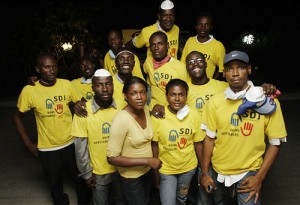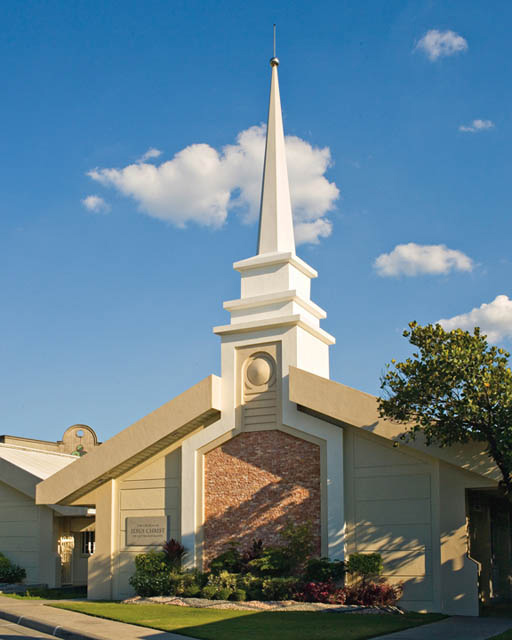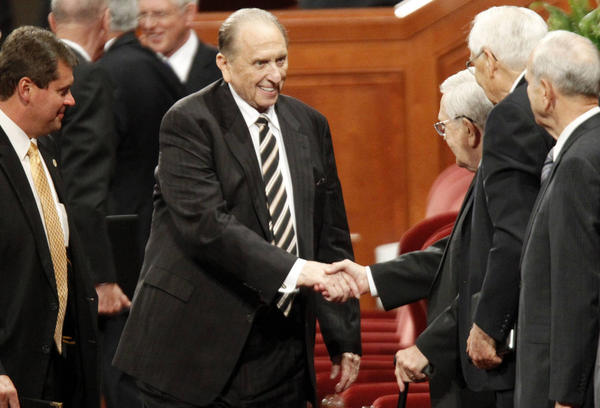If you visit a Mormon meeting, you might be surprised to have a complete stranger walk up to you and address you as Brother or Sister, followed by your last name once it’s known. No, it’s not a way of quickly building up their genealogy—it’s an expression of their religious faith and their commitment to the Savior’s teachings. Mormon’s believe God created Adam and Eve as the first family. They had many children after leaving the Garden of Eden, and everyone who ever came to earth is descended from that single family. This makes us all family. However, Mormon beliefs take this concept even further. Mormons believe we were created as spirits by God, making us all literally God’s children, because he is the Father of our spirits. We lived with Him for a time prior to coming to earth. In Mormon theology, we are all family going clear back to before we were born.
Mormon’s believe God created Adam and Eve as the first family. They had many children after leaving the Garden of Eden, and everyone who ever came to earth is descended from that single family. This makes us all family. However, Mormon beliefs take this concept even further. Mormons believe we were created as spirits by God, making us all literally God’s children, because he is the Father of our spirits. We lived with Him for a time prior to coming to earth. In Mormon theology, we are all family going clear back to before we were born.
When people become Mormons, we tell them they are joining a family. Members of the Church have a special bond of shared culture and faith, and are known for the way they look out for each other, as well as how they care for those outside their faith. Newly baptized Mormons are also told they are joining a “ward family.” A ward is a congregation. Congregations are geographically assigned. Members attend church wherever they are assigned, based on where they live, rather than shopping around for a congregation they like. This makes it easier for Mormons to care for one another, and often helps to increase the diversity of a congregation as well. Where members can visit many congregations to find out which one they like, they may find one where everyone is just like them, and this can be soothing, but it is also limiting in terms of growth. Mormons learn the tools needed to fit in wherever they end up, which is a valuable life skill outside the Church.
Because a ward is considered a family, members are counseled to take care of each other. Naturally, their own families come first—their spouse, children, and parents—but they also have responsibilities toward their larger ward family.
One way Mormons take care of each other is through the home and visiting teaching programs. Mormon men are assigned several families to look after. Each month, they visit the family in the home, and develop a friendship with the members. They meet privately with the father when needed to learn if the family has any needs they might be able to help with, and the families know if they need help, they can first call their home teachers. A home teacher might drive someone to the airport, help with a move, teach the children how to plant a garden, or assist the father in finding new employment. We have had home teachers do all these things. If the family is struggling, perhaps lacking sufficient food, the home teachers would pass along this information to church leaders, who can evaluate the family’s needs and prepare assistance that is beyond the abilities of the home teachers.
Visiting teachers function in much the same way. This program is administered and carried out by women through the Relief Society auxiliary for women. Two women are assigned several women to visit each month. Like the men, they also develop friendships, pray for the sisters they visit, serve where they can, and watch out for their needs. As you can see, women are doubly looked out for.
These two programs have led to many miracles. Older church members living alone have someone checking on them. Young newlyweds living away from home for the first time have someone who is immediately assigned to befriend them, and someone they can call on for emergencies before they’ve had time to make friends the usual way. Young moms may have a visiting teacher who is more experienced and can give advice when asked.
Church members also have their teachers and leaders looking after them. For instance, teenagers, while taught to turn first to their parents, have other adults they can go to for “second opinions” and these adults will share the spiritual values of their parents. Teenagers each have a Sunday school teacher. Sunday school classes have mixed genders, and are divided by age.
They also have two teachers assigned to teach the youth program in each class. The entire youth program, known as Mutual (short for what was once known as the Mutual Improvement program), has six leaders overseeing three classes divided by age. Boys and girls have separate programs. This means the teenager will have his two leaders and four others who oversee other classes, but whom they know from the many activities. Those fourteen and older also have a weekday religion class, which, naturally, has a teacher. These eight leaders and teachers, the home teachers, and the three person ward leadership offers a teenager many choices to go to when he wants advice or needs additional role models.
Despite having shared beliefs, Mormon wards tend to be very diverse. People come from a wide range of backgrounds. They have differing political beliefs and live different lifestyles within the guidelines of the commandments. They are of different ages, and are at different places in their lives. The commandment to be a family helps them learn to accept and get to know people who might be very different from them. They learn, by working and playing together, to accept people from different worlds in a spirit of love and understanding.
 To help you see how this family caring works out in real life, let me share a personal experience. When my children were young, I received word my father had collapsed and had to have emergency brain surgery out of town. My husband was leaving the next day for a new job out of state. We would not be joining him for a month. I was about to be on my own with three young children while packing up an entire house alone and now had to add this traumatic crisis to my life. I called a friend to bring my daughter home that evening from her church event, and she approached three women from church—the women I was assigned to serve as visiting teachers. I happened to be between visiting teachers, since mine had moved and I was moving anyway. But these women I was supposed to be serving came to my door and announced that everything was taken care of. They had arranged overnight childcare for my children during the several days I would be away and even their homeschooling would be overseen. Someone paid their allowances when they learned I had forgotten to do so in all the confusion of leaving town. (They didn’t need them, but this person didn’t want them to miss anything.) When I returned home, I was handed dinner to take with me when I picked up my children. I learned people were lined up to transport my children everywhere they needed to go so they wouldn’t miss their activities until I left. People offered to help with the packing. The last week, meals were delivered to us daily since our refrigerator and stove were on a moving van.
To help you see how this family caring works out in real life, let me share a personal experience. When my children were young, I received word my father had collapsed and had to have emergency brain surgery out of town. My husband was leaving the next day for a new job out of state. We would not be joining him for a month. I was about to be on my own with three young children while packing up an entire house alone and now had to add this traumatic crisis to my life. I called a friend to bring my daughter home that evening from her church event, and she approached three women from church—the women I was assigned to serve as visiting teachers. I happened to be between visiting teachers, since mine had moved and I was moving anyway. But these women I was supposed to be serving came to my door and announced that everything was taken care of. They had arranged overnight childcare for my children during the several days I would be away and even their homeschooling would be overseen. Someone paid their allowances when they learned I had forgotten to do so in all the confusion of leaving town. (They didn’t need them, but this person didn’t want them to miss anything.) When I returned home, I was handed dinner to take with me when I picked up my children. I learned people were lined up to transport my children everywhere they needed to go so they wouldn’t miss their activities until I left. People offered to help with the packing. The last week, meals were delivered to us daily since our refrigerator and stove were on a moving van.
Jesus taught us to love our neighbors and to treat others the way we want to be treated. This Christ-like service is practiced every day in a ward family where even a complete stranger is welcomed as a brother or sister.
About Terrie Lynn Bittner
The late Terrie Lynn Bittner—beloved wife, mother, grandmother, and friend—was the author of two homeschooling books and numerous articles, including several that appeared in Latter-day Saint magazines. She became a member of the Church at the age of 17 and began sharing her faith online in 1992.







Hi Michelle, Our web site doesn’t put people in touch with each other. But I have a contact in Switzerland who will try to call you and help you out. Thank you for reaching out.
Take care,
Patty
I worked in the pest control industry with guys who always called me “brother.” Thanks to this blog, I now know they were Mormon. Can you believe they actually recruit youngsters fresh from their missions to sell pest control door to door? I know many operators have a deep, abiding need to be the hero and rescue maidens from rats and roaches, but I don’t understand the seemingly ubiquitous religious affiliation Mormons and other Christian types have with the pest control industry. Does serving God somehow also include a strong desire to play God?
Not to play God so much. But these companies recruit returned missionaries thinking they know how to solicit, mistaking sharing God’s word with their product. I think it’s sad and a huge scam.
Hey Jake , do you know much about LDS , I’m a little worried as one of my friends from the uk , is marrying a girl and moving to America , what is your experience of them please ? Will he be pressured to join . I alway thought that it was frowned upon for lds to marry outside the church ?
Wow! Your friend is making a lot of big changes. You are a good friend to ask about the experiences he will have. First of all, everyone makes their own choices about who they will marry. It’s a decision between them and the Lord. My brother just married a Lutheran girl who is more Mormon than some Mormons I know. FYI, LDS and Mormon are the same things. They are just different names for the same Christian church. Most LDS people I have met are genuinely nice and are trying to live a life that will please God. You don’t have anything to worry about. As for your friend being pressured to join- that’s not something most LDS people will do. We are encouraged to ask God and listen to His will, and not make any big decisions till we know they are in line with His will. I hope this helps.